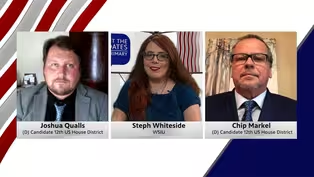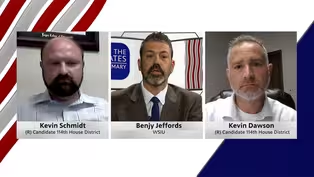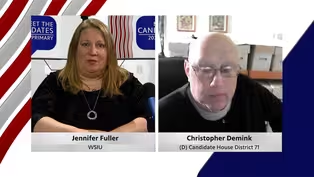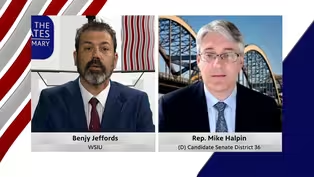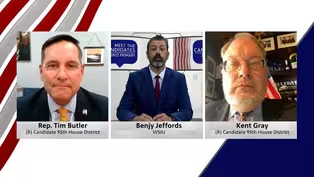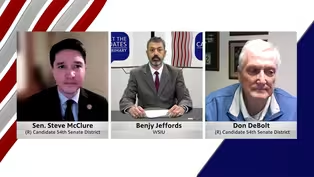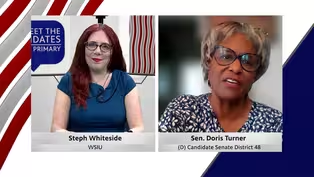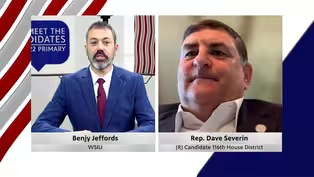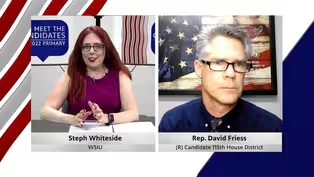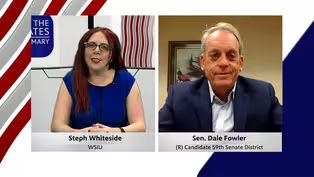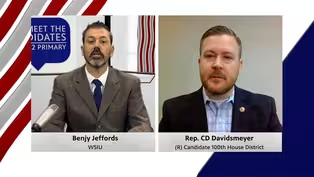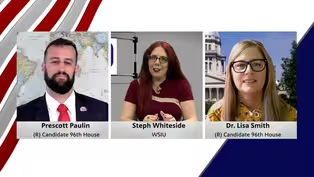Meet the Candidates
104th Illinois House District Primary Candidates
5/19/2022 | 26m 49sVideo has Closed Captions
104th House District candidates Representative (R) Mike Marron and (D) Cindy Cunningham.
WSIU talked with 104th House District candidates Representative (R) Mike Marron and (D) Cindy Cunningham.
Problems playing video? | Closed Captioning Feedback
Problems playing video? | Closed Captioning Feedback
Meet the Candidates is a local public television program presented by WSIU
This series is produced in partnership with the League of Women Voters
Meet the Candidates
104th Illinois House District Primary Candidates
5/19/2022 | 26m 49sVideo has Closed Captions
WSIU talked with 104th House District candidates Representative (R) Mike Marron and (D) Cindy Cunningham.
Problems playing video? | Closed Captioning Feedback
How to Watch Meet the Candidates
Meet the Candidates is available to stream on pbs.org and the free PBS App, available on iPhone, Apple TV, Android TV, Android smartphones, Amazon Fire TV, Amazon Fire Tablet, Roku, Samsung Smart TV, and Vizio.
Providing Support for PBS.org
Learn Moreabout PBS online sponsorshipMore from This Collection
Meet the Candidates features interviews with candidates running for Illinois state, House and Senate races. Guests will discuss key issues impacting Illinois voters such as the economy, the environment, education and public health. This series is produced in partnership with the League of Women Voters.
12th U.S. Congressional Seat Primary Candidate Forum
Video has Closed Captions
Joshua Qualls and Chip Markel, running for the 12th U.S. Congressional Seat. (25m 21s)
114th Illinois House District Primary Candidate Forum
Video has Closed Captions
Dr. Kevin Schmidt and Kevin Dawson, running for the 114th House District. (25m 57s)
71st House District Primary Candidate
Video has Closed Captions
Ahead of the June primary, WSIU talked with Christopher Demink, running for the 71st House (21m 35s)
36th Senate District Primary Candidate Forum
Video has Closed Captions
WSIU talked with 36th Senate District candidate Representative Mike Halpin. (26m 29s)
95th Illinois House District Primary Republican Candidates
Video has Closed Captions
Representative Tim Butler and Kent Gray, running for the 95th House District. (26m 58s)
54th Illinois Senate District Primary Republican Candidates
Video has Closed Captions
54th Illinois Senate District Primary Republican Candidates forum. (25m)
48th Illinois Senate District Primary Democrat Candidates
Video has Closed Captions
48th Illinois Senate District Primary Democrat Candidates forum. (26m 46s)
116th Illinois House District Primary Republican Candidates
Video has Closed Captions
116th Illinois House District Primary Republican Candidates forum. (25m 9s)
115th Illinois House District Primary Republican Candidates
Video has Closed Captions
115th Illinois House District Primary Republican Candidates forum. (23m 14s)
59th Illinois Senate District Primary Republican Candidate
Video has Closed Captions
WSIU interviews Senator Dale Fowler from the 59th Senate District. (27m 29s)
100th Illinois House District Primary Republican Candidates
Video has Closed Captions
WSIU interviews candidate C.D. Davidsmeyer, running for the 100th House seat. (26m 9s)
96th Illinois House District Primary Republican Candidates
Video has Closed Captions
Candidates Prescott Paulin and Dr. Lisa Smith, running for the 96th House seat. (28m 45s)
Providing Support for PBS.org
Learn Moreabout PBS online sponsorship(upbeat music) - This is Meet the Candidates with Primary Candidates for the 104th House District, I'm Steph Whiteside.
WSIU Public Broadcasting and the League of Women Voters are pleased to host today's forum.
The rules are simple, each candidate will have 60 seconds to answer the question and should not mention their opponent in their response.
Joining us today are Representative Mike Marron and Cindy Cunningham.
Thank you both so much for joining us.
- Thank you for having us.
- Glad to be here, thank you.
- Representative Marron, we'll start with you.
What is your number one priority if elected?
I know it can be hard to narrow it down, but please try to stick to just one.
- The number one priority for me has been and will continue to be economic growth in the 104th District.
We have several communities that have had some challenging decades for the last few decades.
Danville and Rantoul lost their economic engines about 30 years ago and have struggled to redefine themselves.
They're wonderful communities, have a lot of resilience, a lot of wonderful people, but we need economic growth.
We need jobs to this area and that has been my focus and will continue to be my focus is the economic prosperity of the 104th District.
- Thank you, Representative Marron.
Ms. Cunningham.
- Well, for me it's a toss up between the economy and crime.
We have got to keep our community safe and we've got to support law enforcement.
My husband was a police officer for 27 years and we've never seen a time like this.
So that's incredibly important, but at the same time, low employment rates and a high demand for goods and services have driven inflation to almost an all time high, which is having an impact.
The economy is gonna depend upon the state for continuing to operate in a fiscally sound manner and paying its bills on time, which we've gotten to in 2022, making our required pension payments, et cetera.
So I will be focused on labor and I'll be focused on criminal justice.
- Thank you, Ms. Cunningham.
And we'll start with you this time.
What would make you an effective lawmaker if elected?
- Well, I'm a very empathetic listener and I don't choose whose opinion matters.
I am listening to all constituents and won't take everyone's concerns with me to the general assembly, where in turn will listen to all of my peers there as well as we all work toward making things better for the good people of Illinois.
- Thanks Ms. Cunningham.
Representative Marron.
- I think I have a very practical perspective on being a legislator.
Certainly I have my core convictions, the things that drive me, but I'm able to step outside of that and listen to other viewpoints and try to come up with solutions that work for everybody.
I've forged some pretty strong relationships in the other party.
You've gotta do that to be effective when you're in the super minority.
I've actually have some very good friends that are Democrats and worked on some meaningful legislation, worked with the IEA on a big piece of legislation last year to actually do away with the pension cap on summer school teaching to get kids caught back up with summer school learning from the pandemic.
So able to forge those relationships and get things done in Springfield.
- Thank you.
For the next question, Representative Marron, the pandemic really exposed disparities in education funding, what would you do to make sure schools in your district are able to meet the needs of families and students?
- Well, I think when we make a list of priorities of what we're spending money on in Springfield, number one top the list is education.
And I think Springfield has to continue to make a shift in prioritizing education funding and taking a larger portion of the funding burden upon state government.
And the only way to do that is to get our fiscal house in order and to continue to take that burden on.
In my district you have several schools that have a low property tax base that really causes some severe challenges.
So we're gonna have to continue to prioritize education funding in Springfield and help the schools that need it the most.
- Thank you.
Ms. Cunningham.
- Well, my daughter, Andrea is studying to be an elementary school teacher at the University of Illinois right now.
So this question is near and dear to my heart.
And also all three of my kids attended public schools in the district.
There were times at the middle school when the drinking water that they had there was contaminated and they couldn't drink it and there were little to no resources to address the issue.
They may still be addressing their dealing with that from time to time having to bring water in.
That seems pretty basic.
We definitely need to invest in more capital projects for schools in the district to resolve issues like that and ours is far from the only one, but that was the one that my own children had to deal with.
But we have got to untie property taxes from school funding because it just creates a tremendous disparity between kids who can learn to live here and kids who have to leave to escape properly.
- Thank you.
And starting with you, Ms. Cunningham, the state budget is a major priority in Springfield.
Name three things that you would prioritize.
- Well, as I said, education, that's got to be a top priority and decreasing the reliance on property taxes to fund our schools.
Pension payments need to continue to be addressed.
We paid ahead this year, which is very good, but we need to continue paying.
We need capital projects for our district.
Our area has been left behind for years and years, especially Danville, Rantoul really needed boost to help the good people that live there.
They're working hard, there's nothing wrong with the work ethic, but they need some help improving life there.
And the fact that law enforcement needs to be supported cannot be stressed enough.
I serve on the Champaign County Sheriff's Merit Commission and my husband is a law enforcement officer of 27 years.
We've never seen it as bad as it is right now, and there needs to be funding for our police officers.
- Thank you.
Representative Marron.
- I think when you're talking about spending priorities in Springfield, top three, you have to be number one education.
From primary education all up through higher ed, especially higher ed is such a critical piece of the economic development portion of the economy in the 104th District.
We have some great community colleges in the University of Illinois, so education tops the list.
Public safety, when you're making a list of what state government should be doing, it should be funding public safety, supporting our law enforcement officers, especially in the horrible environment that we're in right now with crime on the increase.
And then public infrastructure, transportation infrastructure is critical, both for getting our goods to market for businesses and just safety of our people traveling down the roads and cross bridges.
So transportation infrastructure would round out to three.
- Thank you.
And representative, now that we've talked about budget priorities, what are three things that you would cut?
- So first of all, I think we need to make a...
There's a lot of really good programs that we have in Springfield and there's always a good idea, a problem that needs addressed from program standpoint, but I think we need to do a pretty hard evaluation.
Some programs work well, some don't.
So I think all of the programs need a pretty tough evaluation and ones that are not being effective, they need to be cut.
We need to do some sort of means testing for aid when people are young and healthy and able to go to work.
I'm certainly in favor of funding job training programs, but people that can work in the workforce need to work in the workforce.
Thirdly I would say there are a lot of programs that would be on our wants list, not our needs list, and we need to prioritize the programs that are effective on the needs list before we go spending money on things that would be helpful but not necessary.
- Thank You.
Ms. Cunningham.
- Sure, thank you.
So there's two areas where I think that there is room for multiple cuts.
The first would be in our procurement processes.
We have all heard the multiple horror stories about a millions of dollars to rent warehouses with pork that's going to political allies and that's just...
It's appalling, it's a waste of our money and it's one area where Illinois really needs to crack down and that's to resolve the buddy system in procurement.
So I think there's money to be saved there.
The second area is in redundancies.
As we've added programs on through the years, we have now some of the same programs across multiple state agencies requiring regulations and monitoring of those regulations and staff on board.
And I think that if we can merge some of those programs into one and allow monitoring just from one agency, we can save some money there as well.
- Thank you.
And for the next question, Ms. Cunningham, we'll move on to some recent events.
Although the economy is recovering from the early stages of the pandemic, inflation is also on the rise.
What would you do to help Illinoisans who are finding their paychecks don't stretch as far as they did even a couple of months ago?
- Yeah, it's a tough time, but I'm very proud of the budget that was passed by the Democrats, which provided for relief for tax payers, for the gas tax, grocery tax, school supplies.
They expanded the earned income tax credit and overall provided $1.8 billion in tax relief while making an additional $500 billion in pension payments and putting away a billion dollars for a rainy day fund.
We took our payment cycle down from a massive bill backlog to roughly a 15 day payment cycle.
All of those things that we're doing right now, that fiscal responsibility allows us to make our state payments to schools and to municipalities, and in turn that keeps the economy chugging locally.
So I would argue for the fiscal responsibility that we have been demonstrating in the last four years.
- Thank you.
Representative Marron.
- I think the number one thing we can do to combat inflation is get back to a fiscally responsible pro growth attitude in this state.
Certainly I think if you look at what has contributed to the causes of inflation, it's the fact that government spending, especially on a national level where we've contributed to it on a state level as well has run a mark.
We've got continuously past larger budgets in the State of Illinois every year.
And so I think we need to start living within our means.
I think we need to start tightening our belt and getting back to pro growth policies that promote jobs and businesses to come to the State of Illinois.
- Thank you.
Representative Marron, many people are pushing for more renewable energy, especially with the rising price of oil.
At the same time, parts of Illinois have fossil fuel supplies that could provide energy for many years to come.
What would you do to ensure Illinois has a steady supply of energy and keep it affordable for Illinoisans?
- Well, I think right now, especially when you go to the gas station and you see $4 and 50 cents anywhere to $5 a gallon for gasoline and diesel fuel, I think right now we've gotta be open to any energy source.
I think energy is a critical part in what is causing the inflationary cycle right now.
So I think if we're realistic, we realize that green energy is a part of the future.
It's going to be a larger and larger portion of our energy portfolio and a larger portion of our life.
But at this point in time, we need to have all options on the table and we need to seek energy anywhere we can get it, including some of the downstate fossil fuels.
- Thanks, Representative Marron.
Ms. Cunningham.
- Well, we've got to continue our path toward renewable energy and energy efficiency.
Illinois can help that through tax credits for homeowners who install solar panels, go to geothermal heating and cooling, and we can even incentivize the growth of wind energy.
All of these energy sources are cheap and they're good for the environment.
But that being said, we have got to make sure that we bring our neighbors along with us that can't afford these affordable gas prices and can't afford to switch to an electric car.
But surely as the demand for renewables grows, the price is gonna come down.
The more that we build it, there can be an economy of scale that will save money.
But overall, I want the cheapest options available for consumers and right now that's renewable energy.
- Thank you.
And for you again, Ms. Cunningham, COVID-19 really changed the way people look at healthcare and public health.
What would you do to make sure that Illinois is prepared to handle future public health emergencies?
- Well, first of all, let me say that I'm really in awe of the good work that our healthcare workers have done.
My daughter, Katie is a neonatal nurse practitioner, and she's been on the front lines of this.
And the horror stories are just incredible, it's even worse than what we see on television.
So really I am in awe of them and whatever plan we have going forward has got to include more support for healthcare workers because we're just bleeding them out right now.
It's likely we're gonna have another public health emergency, right?
We've had COVID, we've had HIV/AIDS, we've had polio, Spanish flu.
This is just the natural course of events and we have got to figure out how to incentivize the behaviors that we need rather than punish people for behaviors that don't work.
There's been a lot of resentment regarding masks and things like that and we need to solve for that issue.
- Okay, thanks Ms. Cunningham.
Representative Marron.
- I think the legislature plays a very critical role in trying to figure out what we did right and what we did wrong.
And I think we need a pretty stark pretty hard look, pretty hard evaluation at our I guess, or how we did and what went right, what went wrong.
And basically look at things like the issue at the LaSalle Veterans Home, how that was handled by the administration and things like our response across all agencies in the government.
One of the most frustrating things for me as a legislator was handling the overwhelming number of constituent calls, People who were desperate to get help from agencies like IDES.
There were a lot of places where state government fell down at a time when the public was really dependent on government to be there and be functioning.
So we need to take a hard look and figure out where we can do better in the future.
- Thank you.
Representative Marron, gun violence continues to be a problem for communities across the state.
What would you do to address the violence and how do you balance that with Second Amendment rights?
- Well, I think first and foremost, we need to support our law enforcement and we need to get tough on crime.
Certainly I think I'm open to discussions about law enforcement reform, but I think a lot of the reforms that went in place over the last couple of years were not well founded and we need to take a hard second look at those.
And then we need to punish people who use guns illegally.
There needs to be some pretty serious accountability for that.
One thing I'm not in favor of, I'm a very big supporter of the Second Amendment and I don't think we solve criminal issues or stop crime by punishing law abiding citizens who are exercising their constitutional rights in a law abiding way.
I am dead set against that.
- Thanks, Representative Marron.
Ms. Cunningham.
- Well, it's got to be a multi-pronged approach.
There's no one cause of the issue, there's not gonna be one solution.
So we have to support law enforcement, that is for sure.
They have to have the funding and the education that they need to be able to do their jobs and we need to talk about them as the heroes that they are.
But also we need to invest in anti-violence programming.
There is a program that was done at the University of Chicago with a tremendous amount of success.
They're replicating it in the Champaign right now.
And what it does is it looks at people who are likely to become gun offenders and it intervenes before that happens.
Provides job training and cognitive behavioral therapy and support for the needs of people have to make them good citizens.
And we can reduce gun violence without having to take away a single gun from a hunter or a law abiding citizen who needs a gun for protection.
So there are many things that we can do while supporting our Second Amendment rights.
- Thank you.
And Ms. Cunningham, continuing on this topic in a way criminal justice reform is also a hot topic.
Do you support changes to the system including alternative sentencing options like drug courts?
And what changes would you make to ensure safety while also making sure rehabilitation remains an option?
- Well, I thank you for that question.
My husband, as I've mentioned multiple times is a police officer, he was a school resource officer at one point and something that they did in cooperation with the Champaign County State's Attorney's Office was a program called Station Adjustments.
If kids plowed down a mailbox or committed some minor crimes, rather than have them go through the criminal justice system, they could have a station adjustment.
And my husband would work with them on restoring the problem that they created and doing some community service and some mentoring to increase their compliance with the loss.
Danville has a wonderful peer court program that Katie Osterbur runs.
And they do an excellent job of deferring kids away from the criminal justice system.
As we said multiple times, there are some people that just need to not be out on the streets.
They need to be punished and they need to be rehabilitated before they can resume a place in society.
- Thank you.
Representative Marron.
- I'm very favorable of things like drug court.
When I was the Vermilion County Board Chairman, I would routinely attend drug court and meet some of the individuals that were going through that program trying to straighten their lives up.
I'm open to criminal justice reform, it just has to make sense.
I remember, I think it was my first year in Springfield, I was actually one of the few Republicans to support a bill that allowed judges to have some leeway in sentencing because I thought it made sense.
It was just the right thing to do.
But I think some of the things that have been passed, like I said in the last question, in the last few years have gone too far.
And I think we need to take a hard look at some of those reforms and we need to continue to support law enforcement.
That's the most important thing we can do.
And there has to be accountability in the system for people who break the law.
- Thanks.
For you again Representative Marron, recent events like the pandemic and fighting in Ukraine have shown how much Americans can be impacted by global politics with things like supply chain shortages and rising prices.
What would you do to try and help minimize the disruption of events like these on the people of Illinois?
- Well, I think the most important thing that we can do nationally as Americans is to actually start building things here in the United States.
Again, stop relying on nations like China for a lot of the things that we use every day.
And what we can do here in Illinois to support that, we need to be a place that's competitive for businesses again, place where manufacturers want to come and locate.
Which means that we need a more favorable business climate, but we also need to do things like adequately train our workforce.
Here in Vermilion County, we have a little bit of an anomaly where we have really high skilled good jobs that can't be filled.
And we have people that need those jobs, it's just that somehow we can't bridge that gap and get people trained.
So we can do things like that, but we have to become an effective place where manufacturers can come, locate, and build things here for use here in Illinois and in the United States.
- Thank you.
Ms. Cunningham.
- Well, we of course have to work very hard with our federally elected people to address the issue.
And I believe that the supply chain issues are gonna drive the very solution that is needed, which is to produce more goods here.
If we can't get them from overseas, it's going to make sense for manufacturers to open up and build things here.
So part of that solution is in the free market and will happen.
But there's still gonna be a time we will be caught flatfooted like at the beginning of the pandemic where we could not access masks and gowns and gloves and things like that.
And in that case, State of Illinois state workers, provider association, one of them that I'm a member with and the private sector all work together to be able to access these things and get them delivered to the healthcare workers that need them.
So there is lots of good things that we can do with private and public partnerships.
- Thank you.
And this is going to be our last question.
So we will start again with you, Ms. Cunningham.
What would you do to make sure the concerns of your constituents are heard in Springfield, considering the population density skews towards the northern part of the state?
- Yeah, that's less of a problem than I think people might think because there's so many of our issues that overlap, even if the reasons for those issues do not.
For example, both rural and urban areas, they broadband, they suffer from food deserts and transportation issues that are causing these huge health disparities between the more affluent and the less affluent.
And property taxes are sky high all over the state.
Every middle class family in the State of Illinois, regardless upstate, downstate, everybody is affected by it.
So we have a lot more in common than we differ.
And even if the root causes are different, I think that we can start from the point that we need relief from healthcare disparities and new taxes.
- Thank you.
And Representative Marron.
- Well, I think relationships are critical into making sure the people of the 104th Districts voices are heard loud in Springfield.
You do that by creating and building strong relationships.
And I was very proud, last summer I was able to go up and visit one of my colleague's district that represents the City of Rockford.
And then he was down last fall and we got him on a combine, and the first time he'd ever been on the farm or seen anything having to do with corn harvest.
It was just a cool way.
I learned a lot about his district, he learned about my district and I think it's through relationship building like that that you're able to actually...
I get the message across as to what is important to the 104th District.
And I feel like I've been very effective at doing that, and I'm gonna continue to do that as long as I serve in Springfield.
- Thank you.
And thank you both so much for joining us today.
And thank all of you for tuning in for Meet the Candidates for House District 104 with candidates, Representative Mike Marron and Cindy Cunningham.
Tune in next Thursday at 7:00 PM for more forums.
For WSIU, I'm Steph Whiteside.
(upbeat music)

- News and Public Affairs

Top journalists deliver compelling original analysis of the hour's headlines.

- News and Public Affairs

FRONTLINE is investigative journalism that questions, explains and changes our world.












Support for PBS provided by:
Meet the Candidates is a local public television program presented by WSIU
This series is produced in partnership with the League of Women Voters

